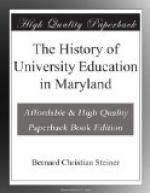The terms university and college have been so frequently interchanged in this country that their significance is liable to be confounded; and it may be worth while, once more at least, to call attention to the distinction which is recognized among us. By the college is understood a place for the orderly training of youth in those elements of learning which should underlie all liberal and professional culture. The ordinary conclusion of a college course is the Bachelor’s degree. Usually, but not necessarily, the college provides for the ecclesiastical and religious as well as the intellectual training of its scholars. Its scheme admits but little choice. Frequent daily drill in languages, mathematics, and science, with compulsory attendance and frequent formal examinations, is the discipline to which each student is submitted. This work is simple, methodical, and comparatively inexpensive. It is understood and appreciated in every part of this country.
In the university more advanced and special instruction is given to those who have already received a college training or its equivalent, and who now desire to concentrate their attention upon special departments of learning and research. Libraries, laboratories, and apparatus require to be liberally provided and maintained. The holders of professorial chairs must be expected and encouraged to advance by positive researches the sciences to which they are devoted; and arrangements must be made in some way to publish and bring before the criticism of the world the results of such investigations. Primarily, instruction is the duty of the professor in a university as it is in a college; but university students should be so mature and so well trained as to exact from their teachers the most advanced instruction, and even to quicken and inspire by their appreciative responses the new investigations which their professors undertake. Such work is costly and complex; it varies with time, place, and teacher; it is always somewhat remote from popular sympathy, and liable to be depreciated by the ignorant and thoughtless. But it is by the influence of universities, with their comprehensive libraries, their costly instruments, their stimulating associations and helpful criticisms, and especially their great professors, indifferent to popular applause, superior to authoritative dicta, devoted to the discovery and revelation of truth, that knowledge has been promoted, and society released from the fetters of superstition and the trammels of ignorance, ever since the revival of letters.
In further exposition of these views, from men of different pursuits, reference should be made to an article on Classics and Colleges, by Professor Gildersleeve (Princeton Review, July, 1878), lately reprinted in the author’s “Essays and Studies,” (Baltimore, 1890); to an address by Professor Sylvester before the University on “Mathematical Studies and University Life,” (February 22, 1877); to




